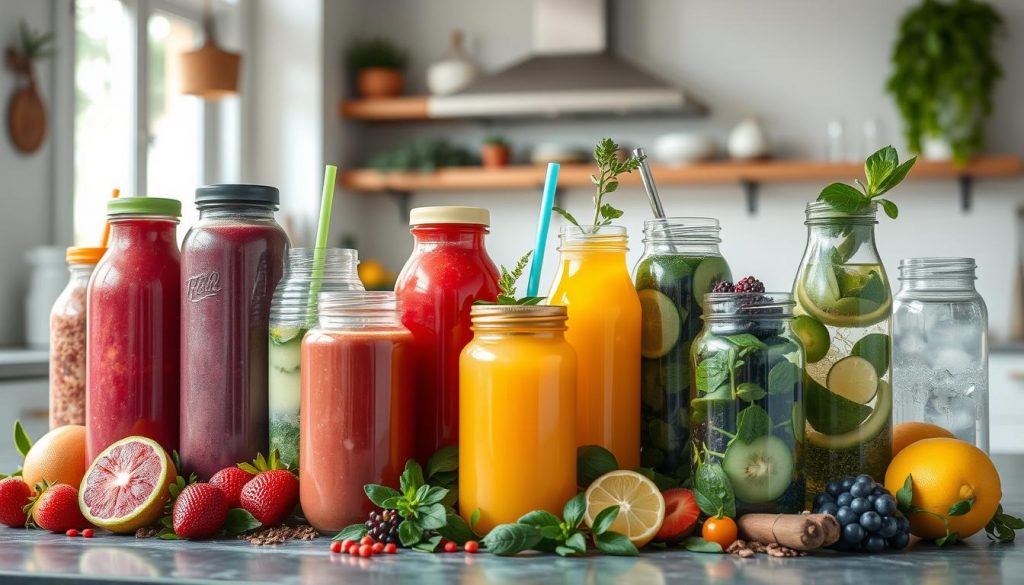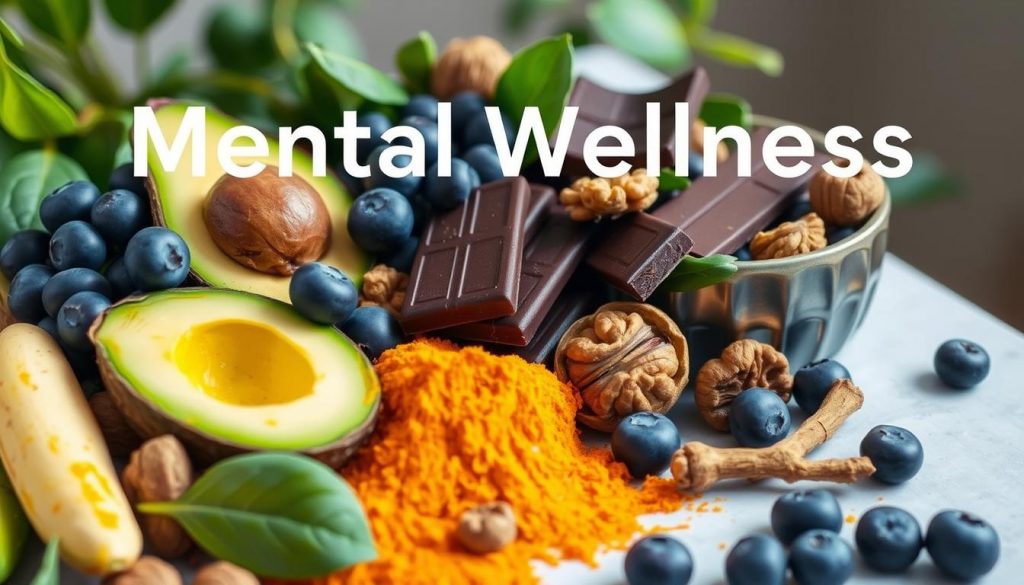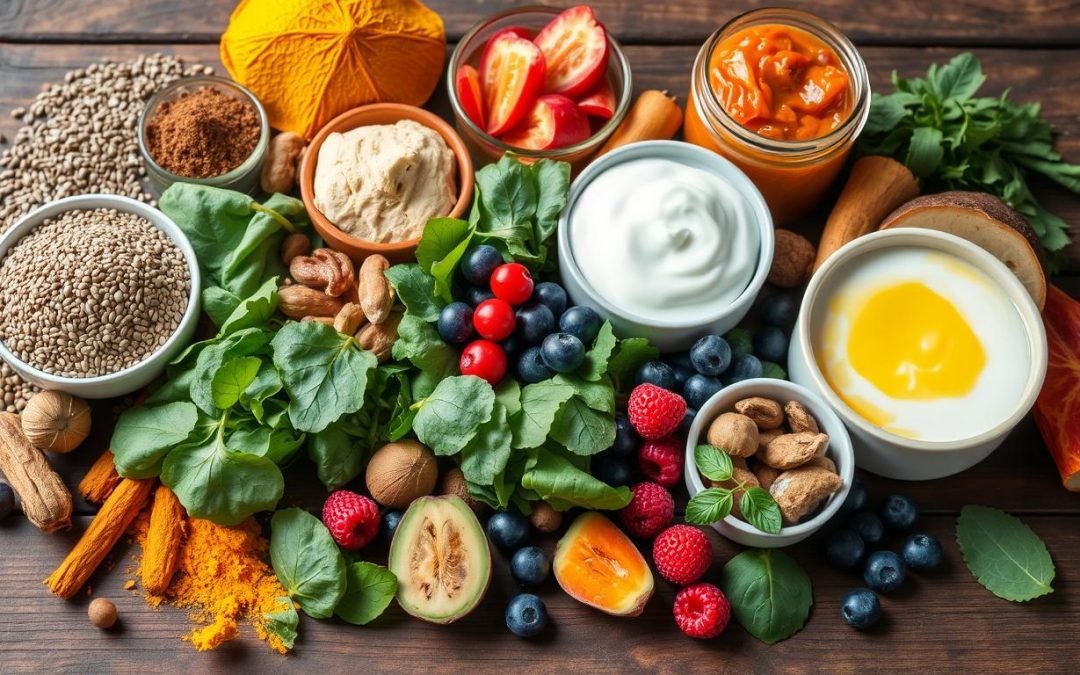Did you know that functional foods offer health benefits beyond just nutrition? You can find them in whole foods like fruits, vegetables, nuts, and seeds. They are also in fortified foods like cereals and dairy products. Eating these foods can help lower the risk of heart disease, cancer, and diabetes1.
Adding functional foods to your diet can improve digestion and boost your immune system. This is a key part of a healthy diet and is essential for getting the most nutritional benefits.
Functional foods are packed with nutrients and offer many health benefits. They help prevent nutrient deficiencies, protect against diseases, and support growth and development1. To learn more about boosting your immune system, visit functional foods for wellness. Discover how a healthy diet and nutritional benefits can make a big difference.
Table of Contents
Key Takeaways
- Incorporating functional foods into your diet can enhance your overall wellness and provide nutritional benefits.
- Functional foods can be found in whole foods and fortified foods, making them a convenient addition to a healthy diet.
- Consuming functional foods is linked to reducing risks of chronic conditions such as heart disease, cancer, and diabetes1.
- A healthy diet that includes functional foods can provide essential nutritional benefits and support immune function.
- Visiting a website like functional foods for wellness can provide more information on supercharging your immune system.
What Are Functional Foods?
Functional foods offer health benefits beyond just nutrition. They are foods with added benefits or special ingredients2. Examples include fruits, vegetables, whole grains, and fermented foods like yogurt and kimchi. These foods are packed with probiotics, which boost gut health2.
Eating foods rich in Omega-3 fatty acids, like walnuts or fish, supports heart and brain health2. Foods high in healthy fats and antioxidants can also lower disease risks2. These superfoods are key for a strong immune system and overall health.
Definition and Characteristics
Functional foods are very nutritious and fight diseases with nutrients, fiber, probiotics, and phytochemicals2. They are often found in restaurants that focus on fresh, local, and rare ingredients.
Examples of Functional Foods
Beans and whole grains are great examples because they’re full of dietary fiber2. Fermented foods, like yogurt and kimchi, are also good for gut health2. These foods can help lower cholesterol and improve health.
Benefits of Functional Foods for Health
Exploring functional foods reveals many health benefits. They match current wellness trends and support clean eating and holistic nutrition. Adding them to your diet boosts nutrition, prevents disease, and improves digestion. They are packed with vitamins, minerals, and fiber, key for good health.
Studies show functional foods can prevent nutrient deficiencies and protect against diseases. They support growth and development. Foods like fruits, vegetables, whole grains, and lean proteins are great examples. These foods have anti-inflammatory and antioxidant effects, fighting chronic diseases like heart disease and cancer.
Enhanced Nutritional Value
Functional foods offer health benefits that support bodily functions and fight chronic illnesses3. Phytochemicals in these foods, like carotenoids and polyphenols, are good for health3. Omega-3 fatty acids in foods like flaxseeds are key for heart health3.
Garlic can lower cholesterol by 10-20%3. Tomatoes, rich in lycopene, may cut cancer risk by 30-50%3. Yogurt, full of probiotics, can boost digestive health, improving gut flora by 100-10,000 times3.
Disease Prevention
Epidemiological studies show that certain fruits, animal products, and vegetables can lower metabolic disorder and cancer risks4. The global functional foods market was $281 billion in 2021, growing at 8.5% CAGR to 20305. People are now more interested in gut health and stress, seeking functional foods for these needs5. For more on functional foods, visit functional foods and discover the latest wellness trends and holistic nutrition.
Key Functional Ingredients to Look For
When looking at functional foods, there are key ingredients to find. A healthy diet with these can offer many nutritional benefits. Look for probiotics, prebiotics, omega-3 fatty acids, antioxidants, and vitamins. These are found in foods like fermented items, fatty fish, and leafy greens.
Studies show that adding these to your diet can greatly improve your health6. For instance, omega-3s can lower heart disease risk. Probiotics support gut health7. Antioxidants protect against cell damage8.
Some examples of these foods include:
- Fermented foods, such as yogurt and kimchi, which are rich in probiotics
- Fatty fish, such as salmon and sardines, which are rich in omega-3 fatty acids
- Leafy greens, such as kale and spinach, which are rich in antioxidants and vitamins
Adding these foods to your diet can bring many health benefits. From better digestion to improved brain function. So, include a variety of these in your meals for a healthy diet and enjoy the nutritional benefits of superfoods.
| Functional Food | Key Ingredient | Health Benefit |
|---|---|---|
| Fermented foods | Probiotics | Supports gut health |
| Fatty fish | Omega-3 fatty acids | Reduces risk of heart disease |
| Leafy greens | Antioxidants and vitamins | Protects against oxidative stress and cell damage |
Functional Foods and Immune Support
Functional foods are key in boosting our immune system and fighting off sickness. They are packed with immune-boosting compounds like probiotics, vitamins, and minerals. This helps keep our immune system strong9. A healthy gut is vital for a strong immune system, and these foods help by adding good bacteria and fiber.
Some of the top immune-boosting functional foods include:
- Yogurt, which is rich in probiotics and can help support gut health
- Kimchi, which is a fermented vegetable dish that contains beneficial bacteria and vitamins
- Garlic, which has antimicrobial properties and can help boost the immune system9
- Berries, which are rich in antioxidants and can help reduce inflammation and promote immune function
According to the third source, foods like yogurt, kimchi, and garlic can make our immune system stronger and lower the risk of getting sick. Adding these foods to our diet can help our immune system and overall wellness. This is a big part of today’s wellness trends.
| Food | Immune-Boosting Compounds |
|---|---|
| Yogurt | Probiotics, vitamins, and minerals |
| Kimchi | Beneficial bacteria, vitamins, and antioxidants |
| Garlic | Antimicrobial properties and antioxidants |
By choosing the right foods, we can support our immune system and overall health. This is closely linked to gut health and immunity10.
Incorporating Functional Foods into Your Diet
To follow a clean eating lifestyle, focus on whole, unprocessed foods. Adding functional foods to your meals can boost your health. This includes better digestion and a stronger immune system. By choosing holistic nutrition, you’re taking care of your overall health.
Adding functional foods to your diet is easy. Try eating fermented foods like kimchi and sauerkraut for their probiotics11. You can also add omega-3 foods like salmon and walnuts to your meals12. Don’t forget to include antioxidant-rich foods like berries and leafy greens12.
Here are some tips for adding functional foods to your meals:
- Start your day with a bowl of oatmeal with berries and nuts
- Add fermented foods like kimchi and sauerkraut to your meals
- Incorporate omega-3 rich foods like salmon and walnuts into your diet
By making these simple changes, you’re on your way to a healthy diet and a balanced lifestyle. Always choose whole, unprocessed foods. For personalized advice, talk to a healthcare professional or registered dietitian12.
Functional Beverages for Wellness
Exploring wellness trends might lead you to functional beverages. These drinks, like smoothies and herbal teas, offer nutritional benefits for wellness. The global market for these drinks is expected to hit $208 billion by 2028, with a growth rate of 8.9%13.
Popular options include probiotic drinks for gut health and energy drinks for a caffeine boost. It’s key to pick drinks with scientific backing and clear ingredients. A survey found 62% of consumers are ready to pay more for drinks with proven health claims13.

When picking functional beverages, look at the ingredients and health benefits. For instance, probiotic drinks can improve digestive health by 12%14. They also offer antioxidants and anti-inflammatory effects, boosting overall health. Adding these drinks to your diet can support your wellness goals, focusing on superfoods and nutritional benefits.
Here are some tips for choosing functional beverages:
- Check for clear ingredient lists and certifications
- Opt for drinks with scientific evidence
- Think about the health benefits, like digestive support or antioxidants
Making smart choices can help you use functional beverages to achieve your wellness goals. This way, you stay updated with the latest wellness trends15.
Plant-Based Functional Foods
Eating a diet rich in plant-based foods can greatly improve your health. This includes better gut health and stronger immunity16. Adding fruits, vegetables, and whole grains to your meals can offer many benefits. These range from better digestion to a lower risk of chronic diseases16.
Some popular plant-based foods include:
- Broccoli, which contains vitamin C, hydroxycinnamic acids, and flavonoids that may aid in preventing diabetes and cardiovascular disease16
- Kale, which provides high levels of vitamin C and lutein, as well as flavonoids and polyphenols that may reduce inflammation and lower blood pressure16
- Zucchini, which is rich in lutein and zeaxanthin, supporting eye health and reducing cataract risk16
Recent data shows that 37% of people think food is better medicine than traditional medicine17. Also, 42% of people bought more functional or fortified foods and drinks during the pandemic17. The plant-based food market has grown by 27% in the last two years18. Almost 60% of consumers look for health benefits on food labels18.
Choosing a plant-based diet can boost your health and well-being. This includes better gut health and stronger immunity16. With the rise in plant-based eating and demand for functional foods, making healthy food choices is easier than ever1718.
| Food | Nutritional Benefits |
|---|---|
| Broccoli | Vitamin C, hydroxycinnamic acids, flavonoids |
| Kale | Vitamin C, lutein, flavonoids, polyphenols |
| Zucchini | Lutein, zeaxanthin, folate, vitamin B6 |
Emerging Trends in Functional Foods
The functional food industry is growing fast, with new trends and products popping up. Personalized nutrition is a big trend, where you tailor your diet to fit your health needs19. This is getting popular, with 60% of people choosing these foods for health reasons19.
New products like probiotic-rich foods and omega-3 fortified foods are also gaining fans. Sales of these foods hit $92.1 billion in 202319. The market is expected to reach $106.9 billion by 2026, thanks to a growing interest in wellness and clean eating19.
Some key trends in functional foods include:
- More focus on holistic nutrition and health prevention
- Increased demand for natural, nutrient-rich products
- Growing interest in personalized nutrition and tailored diets
These trends come from people’s health concerns and the need for affordable, healthy living20. As the industry grows, we’ll see more innovative products and approaches. These will meet the demand for wellness, clean eating, and holistic nutrition.
Functional Foods for Mental Wellness
A healthy diet is key for mental health. Adding superfoods to your meals can greatly improve your mood and brain function21. Foods like salmon, walnuts, and kimchi are great for your brain22.
Eating these superfoods can lower the risk of mental health issues21. It also boosts your overall health21. Research shows a link between gut health and mental wellbeing22. Eating foods that support a healthy gut can help your mental health.

- Fatty fish like salmon and sardines
- Nuts and seeds like walnuts and chia seeds
- Fermented foods like kimchi and sauerkraut
These foods are good for your brain and mental health21. As more people look for functional foods, staying updated is important22.
The Role of Functional Foods in Weight Management
Incorporating functional foods into your diet is key for weight management. They boost nutrient density and cut down on calories23. Foods high in fiber, protein, and healthy fats support weight loss and health. This fits with clean eating by focusing on whole foods.
A holistic nutrition view looks at your diet’s overall quality, not just calories. A balanced meal plan includes a mix of fruits, veggies, whole grains, and lean proteins. For healthy cooking tips, check out cooking tips and reviews. Look for foods with probiotics, omega-3s, and antioxidants24.
Here are some tips for adding functional foods to your diet:
- Start your day with a nutrient-dense breakfast, such as oatmeal with fruit and nuts
- Incorporate lean protein sources, like chicken or fish, into your meals
- Experiment with new functional ingredients, like probiotics or omega-3 rich foods
Small diet changes can boost your health and help with weight management25. Always talk to a healthcare pro before big diet changes.
| Functional Food | Benefits |
|---|---|
| Probiotics | Supports gut health and immune function |
| Omega-3 fatty acids | Supports heart health and reduces inflammation |
Debunking Myths About Functional Foods
Functional foods are often misunderstood, leading to confusion about their benefits26. They can help prevent chronic diseases and improve overall health. Foods like fruits, vegetables, and whole grains are packed with nutrients and are great for a healthy diet.
Some myths say functional foods are a quick health fix or only come in supplements26. But, they are a long-term health investment. They can be found in many whole foods. It’s also important to understand marketing claims, as they often exaggerate health benefits.
To know the truth, look at the science behind functional foods. Studies show that eating lots of fruits and veggies can lower heart disease and cancer risks27. By choosing functional foods and being smart about marketing, you can make better health choices.
- Focus on whole foods, such as fruits, vegetables, and whole grains
- Be mindful of marketing claims and look for scientific evidence to support the benefits of a particular food
- Incorporate a variety of functional foods into your diet to reap the most benefits
| Food | Nutritional Benefits |
|---|---|
| Fruits | Rich in vitamins, minerals, and antioxidants |
| Vegetables | High in fiber, vitamins, and minerals |
| Whole Grains | Rich in fiber, vitamins, and minerals |
Conclusion: Embracing Functional Foods for a Healthier Life
Starting your wellness journey with functional foods can be a game-changer28. These foods are packed with nutrients and help keep you healthy. Adding them to your diet can boost digestion and lower disease risks28.
Your Path to Wellness
Choosing the right foods is the first step to wellness29. Look for foods with vitamins, minerals, and health boosters like antioxidants and probiotics29. These can boost your immune system, improve digestion, and sharpen your mind29. Sticking to healthy eating habits can make a big difference in your life.
Final Thoughts on Functional Food Choices
Remember, not all functional foods are the same29. Choose whole, natural foods that are full of nutrients28. With some knowledge, you can use functional foods to reach your wellness goals and adopt a clean eating lifestyle29.
FAQ
What are functional foods?
What are the benefits of incorporating functional foods into my diet?
What are some key functional food ingredients to look for?
How do functional foods support immune function?
What are some easy ways to incorporate more functional foods into my diet?
How can plant-based functional foods benefit my health?
What are some emerging trends in the functional food industry?
How can functional foods impact mental wellness?
What are some common misconceptions about functional foods?
Source Links
- Functional Foods: Definition, Benefits, and Uses – https://www.healthline.com/nutrition/functional-foods
- Functional Foods & Superfoods: Everything You Need to Know – https://www.escoffier.edu/blog/world-food-drink/everything-you-need-to-know-about-functional-foods/
- From Kitchen to Cure: Unlocking the Health Benefits of Functional Foods – https://jsshospital.in/unlocking-the-health-benefits-of-functional-foods/
- Functional foods and their impact on health – https://pmc.ncbi.nlm.nih.gov/articles/PMC9998796/
- Fueling the Future: Functional Foods Gain Momentum – The Food Institute – https://foodinstitute.com/focus/fueling-the-future-functional-foods-gain-momentum/
- The Role of Functional Ingredients in Achieving Elite Nutrition – https://forwellness.com/blogs/be-well/the-role-of-functional-ingredients-in-achieving-elite-nutrition?srsltid=AfmBOooiKNLoCpjSr2RYKJRpDrH_uSUASBkAEpwFOLG3C4ucTwW1vMAO
- Key Trends in Functional Foods for 2025 – Nutraceuticals World – https://www.nutraceuticalsworld.com/key-trends-in-functional-foods-for-2025/
- Everything You Need to Know About Functional Foods—Plus Where to Find Them – https://www.bhg.com/functional-foods-guide-7377082
- Immune boosting functional components of natural foods and its health benefits – Food Production, Processing and Nutrition – https://fppn.biomedcentral.com/articles/10.1186/s43014-023-00178-5
- Targeted Application of Functional Foods as Immune Fitness Boosters in the Defense against Viral Infection – https://pmc.ncbi.nlm.nih.gov/articles/PMC10421353/
- Functional Foods Explained: The Science of Eating for Wellness – https://fhafnb.com/glossary/functional-foods/
- 7 Functional Foods to Support Your Health and Longevity – https://www.thistle.co/learn/thistle-thoughts/7-functional-ingredients-to-support-your-health-and-longevity
- What Are Functional Beverages? – https://www.waterdrop.com/blogs/magazine/what-are-functional-beverages
- Sip Your Way to Wellness: Exploring Functional Beverages – https://www.riversidehealthcare.org/blog/sip-your-way-wellness-exploring-functional-beverages
- The Rise of Functional Beverages – https://www.news-medical.net/health/The-Rise-of-Functional-Beverages.aspx
- Power of Functional Foods — Area 2 Farms – https://www.area2farms.com/almanac/power-of-functional-foods
- Functional Foods: Fad or Opportunity? – https://nfraweb.org/functional-foods-fad-or-opportunity/
- Rising Health and Wellness Trends in CPG: Functional Foods & Plant-Based Impact — Honest Partners Group – https://www.honestpartnersgroup.com/blogs/rising-health-wellness-trends-functional-foods-plant-based
- 5 Functional Food Trends to Watch – The Food Institute – https://foodinstitute.com/focus/5-functional-food-trends-to-watch/
- Functional nutrition trends. Global opportunities for functional – https://www.innovamarketinsights.com/trends/functional-nutrition-trends/
- Functional Foods & Cognitive Health – https://www.todaysdietitian.com/newarchives/JJ20p40.shtml
- Scientific basis for the development of functional food for mental wellbeing – https://www.nutraingredients.com/Article/2023/07/26/Mental-wellbeing-could-be-enhanced-by-functional-foods/
- The Role of Functional Foods, Nutraceuticals, and Food Supplements in Intestinal Health – https://pmc.ncbi.nlm.nih.gov/articles/PMC3257668/
- What are the most innovative functional food ingredients for weight management? – https://www.linkedin.com/advice/0/what-most-innovative-functional-food-ingredients-weight-nwzkf
- PDF – https://www.ukaazpublications.com/publications/?sdm_process_download=1&download_id=11929
- Debunking Common Food Myths – https://www.scripps.org/news_items/4436-9-common-food-myths-debunked
- Debunking Nutrition Myths: Embrace True Health with Thrive Nutrition’s Expertise — THRIVE NUTRITION – https://www.thrivenutritionmn.com/debunking-the-most-common-nutrition-myths-and-misconceptions
- Functional Foods and Superfoods – https://www.itsallgoodsinc.com/insights/functional-foods-and-superfoods
- Nourishing the Future: The Rise of Functional Foods and Beverages “Striving for the presence of positives and the absence of negatives.” – https://www.linkedin.com/pulse/nourishing-future-rise-functional-foods-beverages-ibeie

